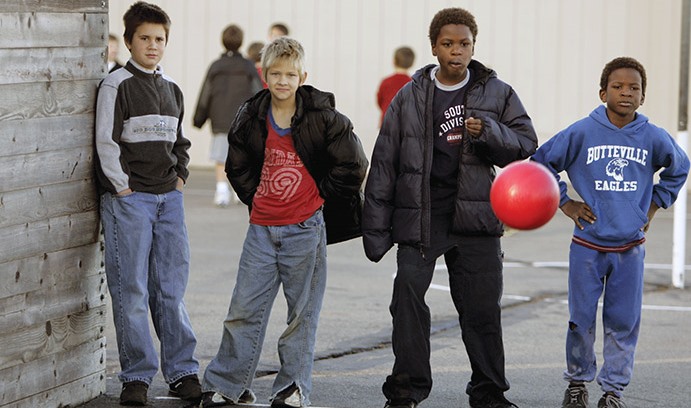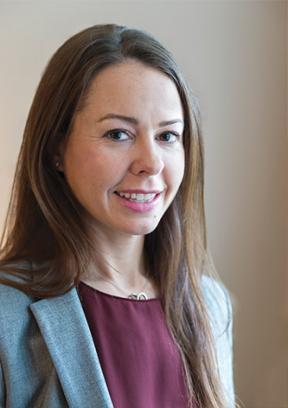Making Choices

Children whose parents talk freely about race, says Hagerman, are more likely to discuss the issue critically themselves. (Image courtesy of Getty Images)
Growing up in a world with racism and inequality, children begin processing ideas about physical racial differences as early as preschool. However, in their middle school years, they begin to develop a greater awareness of the social implications of race.
Margaret Hagerman '04 '06G, assistant professor of sociology at Mississippi State University, studies how the parenting choices of affluent, white parents shape their children's thoughts about race in America. Her research shows that kids ages 10-13 do not simply copy the attitudes of their parents. Rather, children form their own ideas about race through their social interactions in the world. Because of this, the choices parents make about such concerns as schools, neighborhoods, peer groups and travel, matter more than what parents say to their kids about race.
"Parents matter both more and less than we commonly assume," says Hagerman. "My research shows that actions speak louder than words. And this is true even in families where parents talk explicitly about race with their children," she adds.
For instance, in the aftermath of racist hate crimes, bloggers in the media often write about the need to talk more to white kids about race. While Hagerman agrees talking about race is important, her research shows that actions matter more.
"You can talk about race with white kids all you want but subtle things like locking the doors while driving through black neighborhoods, opting for almost exclusively white schools, living in predominantly white neighborhoods, uncritically consuming media filled with racist stereotypes, and so forth, send children powerful messages about race in America, even if these messages are unintentional."
A much broader history of research exists on how black families convey ideas to their children about race. "Most of the research on how children learn about race in the family focuses on children of color and how their parents teach them to navigate and survive in a racially-hostile society," Hagerman says. "For example, how do parents of young black boys talk to their sons about Trayvon Martin or Tamir Rice? What lessons do they offer to help their children not only make sense of these tragedies but to also thrive in a racialized society?"
Hagerman traces her interest in the subject back to the encouragement of a professor during her undergraduate years at Lehigh. As an English major, she enrolled in Professor Heather Johnson's sociology course, Race and Class in America. The subject matter and the professor made an impression on Hagerman, and Johnson became Hagerman's mentor. When Hagerman graduated with her bachelor's degree, Johnson encouraged her to pursue a master's degree in sociology from Lehigh. Hagerman began working on a thesis to determine if children like to participate in social research, in conjunction with Johnson's larger project about how kids think about class inequality. Hagerman graduated with a deep curiosity on the topic and carried those questions into her Ph.D. work at Emory University. Johnson continues to mentor Hagerman professionally, and they collaborate on scholarship.
To find answers to her research questions, Hagerman moved to a Midwestern city and began a two-year ethnographic project. "I tried to immerse myself in the everyday lives of the kids and their families," she says.
Over two years, she interviewed and spent time with 30 families, making herself a part of the community and being very open about why she was there. "In order to gain access to the families, I went to venues where they might be. I attended their kids' soccer and basketball practices. I talked with them. Then, once I found some initial families, they referred me on to others, which is what we call a snowball sample," Hagerman says. She even did some child care in order to spend more time with the families and connect with additional ones.
The bulk of Hagerman's research focuses on middle school children. Despite the fact that child development scholars say this is an important developmental period in a child's life, there simply hasn't been much sociological research about how this age group thinks about race. "In middle school, kids start to think in broader and more ideological terms. They're less focused on themselves and begin to think more about the world around them and how they fit into it. They also have more freedom from their parents and more exposure to activities outside of the home," Hagerman says.
An additional component to Hagerman's research was social class. The families she studied were affluent and could afford to make choices about their children's surroundings. For example, some parents sent their kids to racially diverse schools while others chose schools with largely white populations. Different decisions were made about extracurricular activities and travel experiences too. The choices parents made shaped their children's environments, and ultimately, their thought processes about the social constructs surrounding them. "Social class matters for white racial socialization processes," Hagerman adds. "The families in my study have the resources to choose different things for their kids lives—and these choices matter for how kids think about the social world."
Getting kids to open up about their feelings on race and race relations wasn't always easy, Hagerman says. "White kids know there is power behind the word race. They may not fully understand why but, for some, merely mentioning the topic can bring out some anxiety," she says. This was particularly true for children growing up in what Hagerman describes as "colorblind" families, or families where parents do not talk about race or acknowledge racial inequality. "Some of the children with parents who believe that race no longer matters in America really wanted to know more about race but told me they can't talk about it at home."
Hagerman tried to make the interviews youth-centered. In one instance, she arranged pictures of popular celebrities randomly, with a mix of races across the page. "I asked the kids if they could tell me the race of each of these people and what identifying factors they look for when making these classifications. I found that some of the kids were very hesitant to identify people as "black." They would say "white," for all the people they identified as white, which I was not expecting." The children's behavior generated some interesting discussions, says Hagerman. Why didn't they point out Kobe Bryant, a black basketball player, for instance? "The kids say because it's racist to identify him as black."
This attitude begins to reveal something about how some kids understand what it means to be "racist," says Hagerman, who also asked the children questions about their own lives, the racial makeup of their school, their activities, and other questions about their environments and opinions. She also asked them if and how they talk to their parents about race.
She found that the children who engaged more easily and more critically in discussions about race were the kids with parents who talked more on the topic. "They talked in more sophisticated and concrete terms about current events, like the Arizona ‘Show Me Your Papers' law, or the murder of Trayvon Martin," Hagerman says. "These 10- to 13-year-olds also talked in more sophisticated ways about how they believed race and class interrelate, and they had applied experiences in the world that they drew upon to inform their own opinions."
Hagerman argues in her research findings that not all white children come to the same conclusions about race in America. Instead, a great deal of variation exists depending on a child's environment as well as how openly that child can talk to parents about racial issues.
She also talked to many parents at length about why they make certain choices: where to live, what media to allow at home, which schools their children attend, and about their own experiences growing up with racial socialization. In addition to the interview component to her research, she also observed many of the families as they went about their everyday life.
As she delves deeper into the ethnographic data she has gathered, Hagerman plans to turn her findings into a book about the racial politics of white parenting.
"There hasn't been much research conducted on white families in terms of how kids produce ideas about race, how white racial socialization works, or how social class shapes these processes. But this isn't just a study about white people. It's rooted in a broader project focused on social justice. I am trying to figure out how racism can take different forms among whites during childhood and how racism is reproduced in the newest generation of affluent whites."
Posted on:


